Beginning theory

Beginnings
Series editors: Peter Barry and Helen Carr
Beginnings is a series of books designed to give practical help to students beginning to tackle recent developments in English, Literary Studies and Cultural Studies. The books in the series

demonstrate and encourage a questioning engagement with the new;

give essential information about the context and history of each topic covered;

show how to develop a practice which is up-to-date and informed by theory.
Each book focuses uncompromisingly upon the needs of its readers, who have the right to expect lucidity and clarity to be the distinctive feature of a book which includes the word beginning in its title.
Each aims to lay a firm foundation of well understood initial principles as a basis for further study and is committed to explaining new aspects of the discipline without over-simplification, but in a manner appropriate to the needs of beginners.
Each book, finally, aims to be both an introduction and a contribution to the topic area it discusses.
Also in the series
Beginning film studies
Andrew Dix
Beginning ethnic American literatures
Helena Grice, Candida Hepworth,
Maria Lauret and Martin Padget
Beginning Shakespeare
Lisa Hopkins
Beginning postcolonialism
John McLeod
Beginning postmodernism
Tim Woods
Beginning theory
An introduction to literary and cultural theory
Third edition
Peter Barry

Copyright Peter Barry 1995, 2002, 2009
The right of Peter Barry to be identified as the author of this work has been
asserted by him in accordance with the Copyright, Designs and Patents Act 1988.
The publisher has no responsibility for the persistence or accuracy of URLs for external or third-party internet websites referred to in this book, and does not guarantee that any content on such websites is, or will remain, accurate or appropriate.
First edition published 1995, reprinted nine times.
Second edition 2002, reprinted seven times.
This edition published 2009 by
Manchester University Press
Oxford Road, Manchester M13 9NR, UK
and Room 400, 175 Fifth Avenue, New York, NY 10010, USA
www.manchesteruniversitypress.co.uk
Distributed in the United States exclusively by
Palgrave Macmillan, 175 Fifth Avenue, New York,
NY 10010, USA
Distributed in Canada exclusively by
UBC Press, University of British Columbia, 2029 West Mall,
Vancouver, BC, Canada V6T IZ2
British Library Cataloguing-in-Publication Data
A catalogue record for this book is available from the British Library
Library of Congress Cataloging-in-Publication Data applied for
ISBN 978 0 7190 7927 6 paperback
This edition first published 2009
17 16 15 14 13 12 11 10 09 10 9 8 7 6 5 4 3 2 1
Typeset
by Newgen Imaging Systems Pvt Ltd, Chennai, India
Printed in Great Britain
by Clays Ltd, St Ives plc
Contents
Acknowledgements
Youd better not look down,
If you want to keep flying
So says the great B. B. King. It is excellent advice, and trying to stick to it helped me to complete this book. I was also greatly helped by the advice and expertise of Anita Roy, Humanities Editor at Manchester University Press. Annie Eagleton was a meticulous and helpful copy-editor, and Alison Abel provided valuable help at the proof-reading stage.
Many of the chapters are based on material I used on the Introduction to Literature and Concepts of Criticism courses at LSU. The former is taught by a team-ministry of various colleagues, whose comments and advice I have been most grateful for over the past few years. In particular, I must thank Gillian Skinner for reading sections of the manuscript and making a number of extremely useful suggestions, all of which I have acted upon. Nicola King supplied the What feminist critics do checklist, and I have adopted this idea for all the chapters. Of course, all the faults which remain in the book are entirely my own responsibility.
Steve Dorney rescued me when my technical expertise proved unequal to the task of producing hard copy from my (as I thought) cunningly adapted disks. Marianne and Tom enabled me to write the book by giving me frequent periods of study leave from Sainsburys and Playdays. The book is for my mother and in memory of my father, Francis Barry.
I will be most interested to hear from any users of this book who might wish to write to me (either via Manchester University Press, or directly to English Department, UCW, Aberystwyth, Ceredigion SY23 3DY, Wales, UK (ptb@aber.ac.uk)). If anything in the book seems unclear, or unnecessary, or misrepresented, or wrongly omitted, or fails to acknowledge a source, I will endeavour to improve or rectify matters in any subsequent edition.
Sections of have previously appeared (in a slightly different form) in The Use of English and The English Review.
Peter Barry
LSU
Preface to the second edition
Since the first edition of this book (which was written in the earlier part of the 1990s) literary theory has continued to change and develop. To reflect these developments, I have added a new chapter on ecocriticism, making this the first book of its kind to register the increasing interest in Green approaches to literature.
Of course, my own feelings about the various kinds of theory have changed a bit too. In particular, I now find structuralism rather more interesting than post-structuralism, and to reflect this I have added a new chapter on narratology, a branch of structuralist theory which lends itself very readily to enjoyable and thought-provoking practical applications. Apart from these new chapters, the second edition is the same book as the first, but with up-dated bibliographies.
With my colleagues at Aberystwyth I teach on a range of theory courses, notably the RTRT modules (Reading Theory/Reading Text), whose original twenty-seven mini-topics I helped reduce to four somewhat larger ones. This is more or less what the structuralists Lvi-Strauss and Todorov wanted to do to the thirty-one narrative functions posited by Vladimir Propp (see ), which shows how keen we are at Aber to apply the lessons of literary theory to our everyday teaching lives. I am very grateful to my colleagues and students for all the discussions we have had about RTRT, and to students on the Short Story option over the past few years with whom the various theoretical approaches to narrative have been tried out.
The cartoon narrative on is supplied courtesy of Gray Dudek, Marketing Division of Pedigree Masterfoods, a division of Mars UK 2001. I am very grateful to Matthew Frost at MUP for his tireless promotion of this book (which is now part of the Beginnings series), and, for nearly everything else, to Marianne and Tom (who has graduated since the first edition from Playdays to Gameboy Advance).
English Department, Aberystwyth
Preface to the third edition
The third edition of Beginning Theory is, like the second, an expanded edition rather than a revised edition in the strictest sense, though corrections have been made throughout and reading lists updated. The first edition of this book was built in the 1990s on foundations laid down during the theory wars of the 1980s. A ruthless stripping out of all its period features would risk altering the character of the building too fundamentally, and thereby reducing whatever value it might have. So I have opted instead to follow the advice of the property programmes on television and have built a couple of extension chapters.
Next page
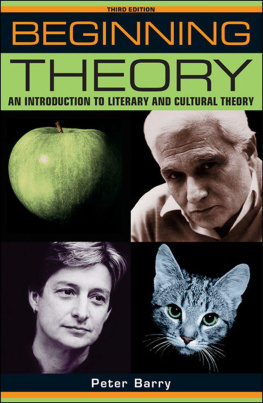

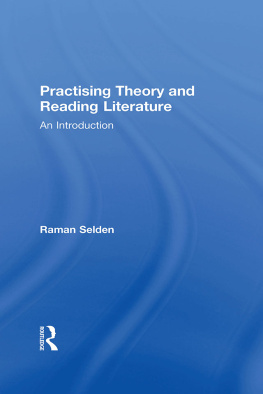
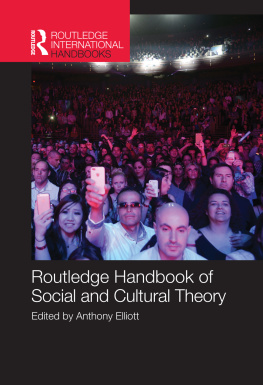


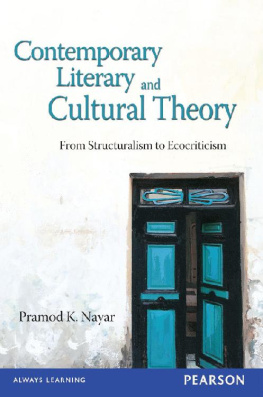
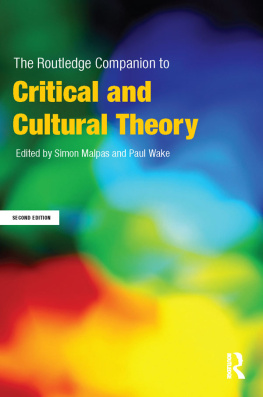
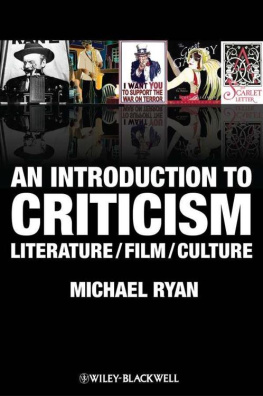

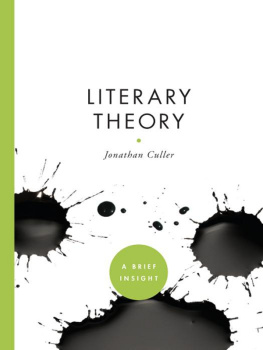

 demonstrate and encourage a questioning engagement with the new;
demonstrate and encourage a questioning engagement with the new;